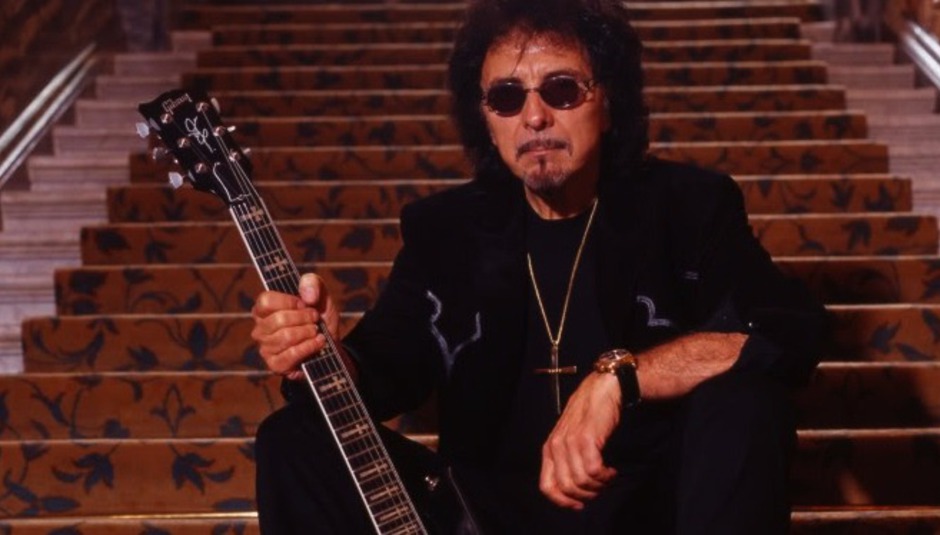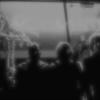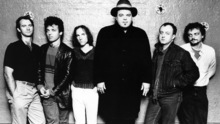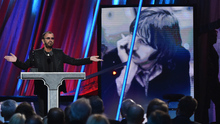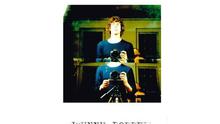"...and he's such a nice bloke." I'm eavesdropping a conversation in the morning, about how lovely Tony Iommi is. He'll need to be, I think. He's about to get asked when Sabbath are reforming twenty times in a row. Another thing I overhear sticks in my head all day. "When I was shaking his hand, I realised... I'm touching The Hand of Doom!"
This sentence reverberates in my brain, recomputes and echoes. It stops briefly when I bump into Noddy Holder, who has a pimp stick and an Iphone. But then it begins again. By the time I meet Mr Iommi, the man who wrote the riffs to Iron Man, War Pigs, Children of The Grave, it is a constant. I'm reaching out to touch the Hand of Doom. I'm touching the Hand of Doom. I've just touched the Hand of Doom. Then it stops, and I look at him. He's a slight man physically, and looks like he's lived well and then repented. It's unlikely he's ever been very fat, but he's been significantly more plump than he is now. He looks tanned and happy, and behind him, in the background of the small nicotine tinted room, I notice a sink and a hand-dryer. It's not just the Hand of Doom. It's the clean Hand Of Doom.
DiS: What did Birmingham mean to you when you were growing up?
TI: When I was growing up, where I lived, Birmingham was very gang infested. It was weird... I wouldn't say it didn't shape us up in a certain way because we saw the different sides of life. We learnt a lot from where we lived and certainly where we worked, the industrial side of it, working in factories and stuff. It does make you grow up quick really.
DiS. If Sabbath were to emerge in present day Birmingham, how do you think their chances would be? With more bands, more competition?
TI: I don't know, it'd depend on what would be around now. Would this music exist if we hadn't have been there? That's a neverending question...
DiS: What did the different front men bring to Sabbath? What were their strengths and weaknesses?
TI: Well, Ozzy and the original line up was always going to have a certain love, and it does. And we all worked together, and came up with something we developed. But after Ozzy we had Ronnie James Dio, and we took a slightly different way of writing then, I think Ronnie brought a lot to us at that time. A bit more organization, he pushed us a bit more, and it allowed me to write in a different way. After him, Ian Gillan...
DiS: For one album?
TI: For one album and a tour. It was a different way of working.
DiS: Tony Martin?
TI: Tony Martin... he's a really good singer with a good voice. It was just difficult for him, like it's difficult for a lot of singers, because they've got to fill someone's shoes. Ronnie had a big job after Ozzy, but he won through. Tony after Ronnie... the only downside was that he wasn't as experienced as Ronnie, but his voice was really good.
DiS: With all of the different branches of Metal that exist now, do you still consider your music Heavy Metal?
TI: When we started, I thought of us as Heavy Rock. Heavy Metal as a term wasn't around for quite a while later. The first time I heard it was coming back from America after living there for a few years, and I'd done an interview with Melody Maker or NME... And it was the editor who mentioned that to me. "You're Heavy Metal." "What's that?" "That's what you play!"
That was the first time I'd heard that phrase, apart from when Steppenwolf used it.
DiS: Are there any Black Sabbath records you aren't entirely happy with?
TI: Well, the original stuff was how it was. If you weren't happy at the time, you'd always think that you could have done this or that. Certainly later on one of the albums I didn't like was Forbidden, with Tony Martin. I don't think any of us liked it, it was a weird situation really. We had Ice-T on it for a stat, and he was a nice bloke, and he did good; we also used his guitar player (Ernie C) to produce it, and we hadn't had a producer for years. And it was a disaster.
DiS: If you were going to go back into the studio with the original line up, what would be your benchmark? Albums like Nostradamus by Judas Priest, a strong late period album?
TI: If we were to go into the studio again, we'd create what we feel like. That is, a Black Sabbath record. Once we all get together and play, we automatically make that sound.
DiS: If it wasn't to your satisfaction, would you release it?
TI: No.
DiS: It'd have to be bang on?
TI: Absolutely. We couldn't get away with it doing that, and we wouldn't want to do that.
DiS: Would you look at it in terms of legacy, in respect to the quality of your early albums?
TI: We'd look at it as we'd want it to be musically the best we can do, and vocally the best we can do.
DiS: You went back into the studio to do a couple of tracks for a best of?
TI: Yeah, that was a bit too quick. It was only me and Ozzy really, and we put them down, and then the others came in, and they hadn't even heard them. They played on them, but that was a different way of writing for us. We never wrote that way, we always write as a band.
DiS: When Ozzy finally retires his solo career, what would be the potential barriers to a full reunion?
TI: We'll have to see! We've been together, not been together, broken up... so you never know. The question is always asked, "Will you ever get back together?". But I think we'll have to wait and see. You can never answer those questions, because we've always said "No, we're never going to do it."
We said that with Ronnie, and then we got back together with him. We said it with Ozzy and we got back together with him. When we got back together to do the last shows we did, we had a great time, and it was good playing with the guys again. So we'll have to wait and see.
---
Home of Metal - Part One: The Art of Mark Wilkinson
Home of Metal is a celebration of the music that was born in the Black Country and Birmingham, and is a project created and produced by Capsule. For more info visit http://www.homeofmetal.com

